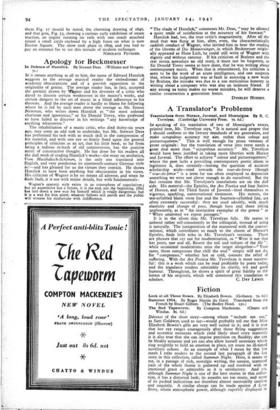A Translator's Problems
Translation. from Horace, Juvenal, and Montaigne. By R. C. Trevelyan. (Cambridge University Press. 75. 6d.)
IN speaking of his translation of two of Montaigne's essays, printed here Mr. Trevelyan says, "It is natural and proper that I should conform to the literary standards of my generation, and make scrupulous accuracy my aim, rather than colour and picturesqueness." This is well enough for prose versions of prose originals: but the translation of verse into verse needs a great deal more than "scrupulous accuracy." Mr. Trevelyan would have been justified in taking more liberties with Horace and Juvenal. The effort to achieve "colour and picturesqueness," where the poet lacks a prevailing contemporary poetic idiom to legitimise it, does certainly—leaving the question of accurate scholarship aside—tend towards the tour-de-force (though "tour-de-force" is a term far too often employed to depreciate something we were not clever enough to do ourselves). But the fact remains that Mr. Trevelyan's translations arc on the dull side. His material—the Epistles, the Ars Poetica and four Satires of Horace, and the Third Satire of Juvenal—lend themselves to vigorous, sparkling, conversational treatment. His metres, the ten-syllablcd blank verse line and the fourteen-syllabled line, are often extremely successful : they are used adroitly, with much elasticity and change of pace, though here and there jolting unpleasantly, as in "An instructive exemplar of the power" or "When uninvited we repeat passages."
It is in the idiom that Mr. Trevelyan fails. He seems to unbend rather self-consciously to the colloquial, instead of using it naturally. The juxtaposition of the mannered with the conver- sational, which contributes so much to the charm of Horace's Epistles, finds little echo in Mr. Trevelyan's versions. There are phrases that cry out for modernisation, as "Were it not that her poets, one and all, Resent the toil and tedium of the file": while occasional modernisms miss the target altogether—" Your cares, those compresses that chill the soul" simply will not do, for "compresses," whether hot or cold, connote the relief of suffering. With the Ars Poetica Mr. Trevelyan is more success- ful: this is a work which can be read profitably by poets today, and the translator renders admirably its clarity, wit and good humour. Throughout, he shows a spirit of great fidelity to the letters of his originals, which will commend this translation to






























 Previous page
Previous page